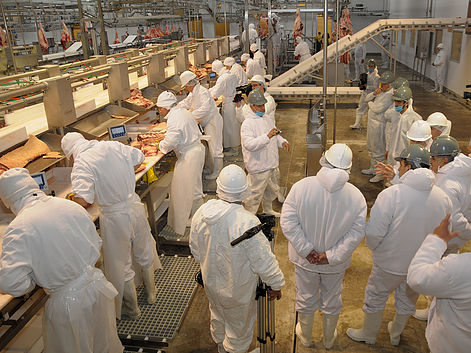Norwegian body seeks to ward off TTIP’s negative impact

Global Meat News | 11 May 2016
Norwegian body seeks to ward off TTIP’s negative impact
By Poorna Rodrigo
Damage to Norway’s trade, due to the world’s largest free trade agreement, could be minimised if the country lowers its import tariff on agricultural products, including the meat sector, the Norwegian Institute of International Affairs (NUPI) has suggested.
Norway is outside the 28-nation EU and is therefore not participating in negotiations on the Transatlantic Trade and Investment Partnership (TTIP) between the US and the EU.
Hege Medin, NUPI’s senior research fellow, said: “The point is that we must expect consequences [on Norway’s trade].” She argued that, should the need arise to negotiate a separate free trade agreement with the US or if the opportunity arose for Norway to be part of TTIP negotiations, the country’s extremely high tariff on agricultural products would be a “barrier” in the process.
Other parties are expected to request a tariff decrease, she said, adding: “These are just possible scenarios that we are looking into.” Finally it is up to the government to decide on it, she added. The Norwegian government has assigned NUPI to assess the impact of the TTIP on Norway’s trade and submit a final report by September 2016.
Norway’s current tariff rates on meat imports are among the highest in the world. The rate is a massive 429% for a lamb whole carcase and NOK76.96 (US$9.35) per kilogram of deboned lamb. For beef fillet, the rate stands at 344%, while the rate per kg for the whole carcase is NOK32.28 (US$3.92). Meanwhile, pig meat has a tariff of NOK24.64 (US$3.00) per kg, while deboned product is NOK64.96 (US$7.90) per kg, according to statistics from Kjøtt- og fjørfebransjens Landsforbund (KLF), Norway’s meat and poultry association.
KLF’s CEO Bjørn-Ole Juul-Hansen defended these rates, saying it was “important to protect the country’s meat sector” and farmers. Despite high tariffs, there are quotas in place for meat imports from the least developed countries and from South Asian Association for Regional Cooperation/SAARC countries (Afghanistan, Bangladesh, Bhutan, India, Maldives, Nepal, Pakistan, and Sri Lanka), and outside quotas Norway allows 10,000-12,000 tonnes of beef imports annually. He said there were no efforts to lower any import tariffs on meat in Norway. Instead, the government was negotiating on allowing quotas from some countries, which he said would not have any big impact on the domestic meat sector.
However, according to NUPI, unless import tariffs on agricultural products are lowered, Norway’s seafood exports to the US are at stake. “Around 5% of Norway’s seafood exports go to the US, and even if it is only 5% it is significant,” Medin insisted. “Additionally, there are other sectors, like shipping and services [that we have not yet estimated] that would be at stake due to the TTIP.”
Norway is in a safer position with regards to its trade with the EU. Medin said: “Norway has a free trade agreement with the bloc and is part of the European Economic Area, giving the country better leverage in doing trade.” But Norway has no free trade agreement with the US and losing that market to TTIP would be costly to Norway, she said.
Medin summed up: “At the end of the day, we have a defensive interest in agriculture, but an offensive interest in seafood, so it is up to the government to weigh the options and act on it.”





